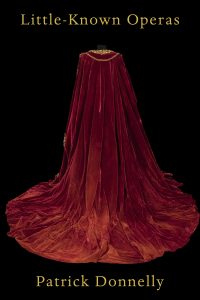LITTLE-KNOWN OPERAS, Patrick Donnelly
by Scott Hightower · September 11, 2019 LITTLE-KNOWN OPERAS, Patrick Donnelly
LITTLE-KNOWN OPERAS, Patrick Donnelly
(Four Way Books, 9781945588310, 2019, 15.95)
In one of the opening poems of Patrick Donnelly’s “Little-Known Operas” an-eater-of-songbirds covers his head to conceal his vain mortal appetite from the eyes of God. In Nocturnes of the Brothel of Ruin, Donnelly’s previous book, Donnelly proved himself to be a master of small images to evoke gigantic reverberations. Indeed, all islands are connected under the water. Take Brigadoon, Frost’s grail in the poem “Directive”, the Rothko Chapel, a tear of rosin, a cup of ice, the voices of the poet Garcia-Lorca and the soprano Maria Callas, the notion of Jesus meditating on a Japanese scroll painting, add a daub of the perfume “My Sin” (for the author’s mother) and a daub of “White Shoulders” [for my mother], and…. voila: lift off! Human sadnesses, frailties, and accusations turn into notable affection and compassion. Overspilling carves out empty uniquenesses—from the Grand Canyon to the lives of Jesus and Maria Callas.
There is a notion that there are three frequencies among the living: making, operating, and consuming: “I’d made nothing for months, just consumed / or operated what others made.” Donnelly—like Mark Doty’s favrile and Yusef Komunyakaa’s maggot–masterfully does not untie any knots, but he certainly honors mystery. In one poem, the voic—beginning with disingenuity—ends in clarity: “I who do not / have visions or want any but for all that is the sad world not yet / utterly emptied of parable? Does the young corn still put / his ear above the soil like a flute?”
In one poem there is a descant of Whitman’s transcendentalism in the mowing of grass. The juice shop on 23rd Street (Chelsea, NY) which used to optimistically serve pressed wheatgrass also makes a brief appearance in the poem. In another, the opera Don Giovanni informs the sobriquet “Honey.” In yet another, the flecks of color in a fragile bud of peony moves into a mediation of more venial human dermis spots. There are meditations on one’s preferences in the steaming firmament; meditations on the glimmer of limitless light. Even one’s warm vacancy in the bardo is considered with a revealing amount of tenderness. Like constellations or little known operas, Donnelly’s metaphysical epiphanies leave their own unique trail of poetic warmth and wakefulness. Indeed, all islands are connected under the water. Donnelly’s “Little-Known Operas” is an all-around lovely book.
